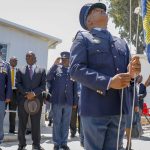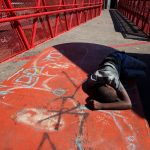Militarisation is no solution to the crisis of Cape gang wars
The thousands of gang-related deaths on the Cape Flats are as much a result of the state neglecting its basic duties to its citizens as gangsters’ bullets and blades.
Author:
15 July 2019

Jade Johannes was four years old. Lesley-Ann was six. They were gunned down in Valhalla Park while walking to a nearby spaza shop with a relative on Christmas Eve last year. Like so many others they were caught in the crossfire of a drive-by gang shooting.
Since last weekend, 55 people have either been shot or stabbed to death. There have been 1 875 deaths since January. In Philippi East the murder rate increased by 180% in the five years from 2013/14 to 2017/18.
Gang warfare on the Cape Flats has centred on turf wars linked to various drugs, gun racketeering and the abalone trade. The turf war has accelerated in the last 10 years as crystal methamphetamine – more commonly known as tik – has ravaged the Cape Flats.
In the parts of Cape Town in which impoverished black people live, everyday life is saturated with violence at levels comparable to countries like El Salvador, Guatemala and Honduras.
As in a city like Rio de Janeiro, there are parts of Cape Town in which significant efforts are made to ensure that life is respected and protected, and parts of the city in which people are treated as if their lives were expendable. This spatial logic coincides closely with race and class.
State culpability
In 2018, the equality court ruled that the allocation of police resources in the Western Cape unfairly discriminated against people who are black and poor.
Africa Criminal Justice Reform researcher Jean Redpath, who gave expert evidence in the equality court, said that nationally 283 police officers are allocated to every 100 000 citizens. She found that in the Western Cape the “most resourced [area] was 2 636 per 100 000 in the policing area Table Bay Harbour and least resourced area 111 per 100 000 in Harare”. She also found that the high levels of violent contact crimes in largely poor and black areas received fewer police resources than wealthier, safer and predominantly white suburbs.
Related article:
The state’s responsibility for the crisis exceeds the systemic neglect of the largely impoverished areas of the city. Corrupt police officers have been selling guns to gangs at significant scale, and protecting key figures in the underworld. Sustained progress will not be possible without addressing the corruption in the police force, which is but one aspect of a broader corruption of the state. Fixing this requires sustained and carefully thought-out strategic action.
The fundamental problem has been a lack of political will to address the crisis. This lack of political will is predicated on an evident contempt by the state for the people who must make their lives amid a constant storm of gunfire, fear and mourning.
In A History of Violence, his searing account of violence in central America, Óscar Martínez writes, “Here live the nobodies. When the authorities leave or don’t do their jobs, the nobodies remain, living alone and according to laws set up by those filling the power vacuum, the laws of the blade and the bullet.” The parallels with the situation in Cape Town are clear.
Machismo and militarisation
Police Minister Bheki Cele is a notorious populist who has repeatedly preferred the machismo of dramatic and invariably authoritarian made-for-media gestures to the painstaking work of addressing the systemic problems in the police force.
It was Cele who, as Police Commissioner, introduced the “shoot-to-kill” directive for police officers in 2009. In the same year he established the Tactical Response Team (TRT), also known as the amaberete. The TRT was a militarised unit that quickly became notorious for gratuitously violent conduct. Following the Marikana massacre in 2013, in which 58 of the 105 police shooters using live ammunition were from the TRT, there were calls for the unit to be disbanded.
In 2017 then Police Minister Fikile Mbalula, another reckless populist given to authoritarian public gestures rather than substantive political work, relaunched the TRT. Last year, after a spate of gang-related killings claimed the lives of several bystanders in Westbury in Johannesburg, Cele deployed the TRT.
Related article:
In 2012 then Premier of the Western Cape and Democratic Alliance leader, Helen Zille, requested the intervention of the army. At the time a spike in gang violence cost the lives of 23 people, including seven children. Close to 80% of the deaths took place in just two suburbs: Hanover Park and Lavender Hill.
Zille’s request was denied. But in 2015 the army was deployed against civilians for the first time since the end of apartheid, during Operation Fiela, an alarmingly xenophobic state campaign against migrants.
Any state that feels it necessary to deploy the army against its own civilians has failed in its most basic task: to secure the safety of the people it governs, and to do so through democratic means. And when the police are militarised, or the army is deployed against civilians, global experience – from Ferguson, Missouri, to countries such as Brazil and Haiti – shows that the outcome is frequently an escalation in violence, and a normalisation of repressive forms of domination against impoverished and racialised communities.
In Brazil and Haiti the deployment of soldiers with the express aim of targeting criminal gangs has resulted in numerous civilian deaths at the hands of the military, and it has not resolved the problem of criminal violence.
Effective political organisation
It is undeniable that confronted with impunity for relentless criminal violence, and a deeply corrupt police force, people frequently request military intervention in the hope that soldiers from out of town will not be compromised by corrupt forms of association with local criminals. Desperate residents have been calling for the army to restore order in Cape Town for many years, and at times similar requests have been made elsewhere in the country too.
The current plan is that the army will be stationed for three months in 10 areas: Bishop Lavis, Mitchells Plain, Delft, Elsies River, Nyanga, Khayelitsha, Mfuleni, Philippi, Kraaifontein and Manenberg.
However the crisis in Cape Town will not be resolved until people treated as “nobodies” are able to assert themselves as “somebodies”. Ultimately, this will require effective forms of political organisation and mobilisation.


